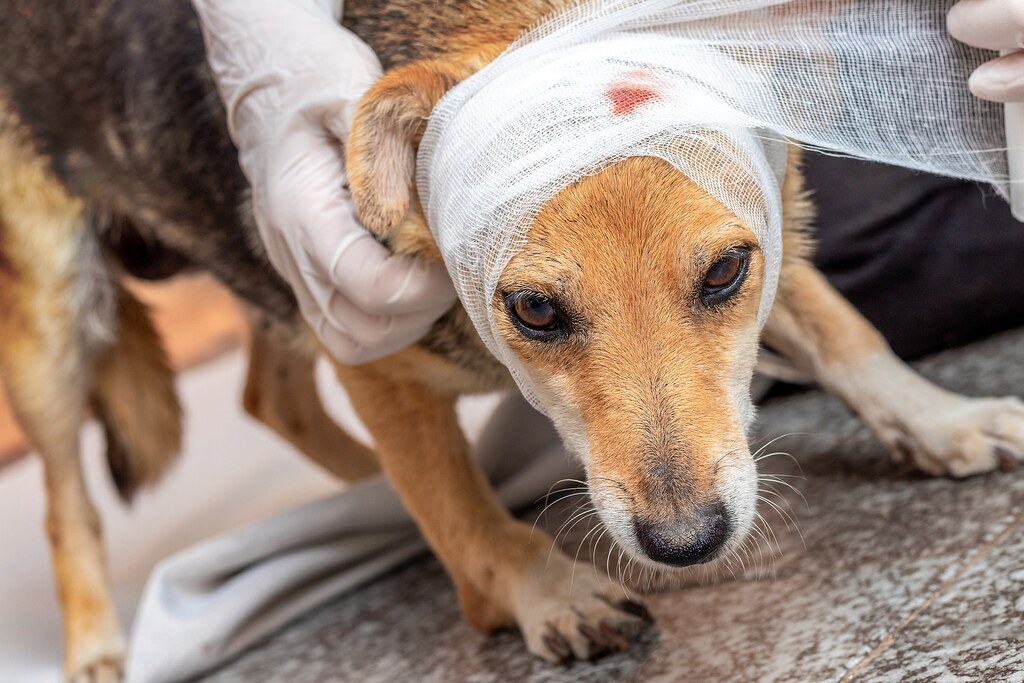
We consider our animal pals to be beloved family members, and we care deeply about their welfare. Dogs, however, are not immune to unexpected health problems that call for prompt Emergency Vet attention.
With over 46,631 emergency veterinarians currently employed in the United States, it’s crucial for pet owners to recognize when a situation demands urgent care. These specialized professionals are 74% more likely to work at private clinics, offering crucial, timely intervention when your pet’s health is at risk.
In this article, we’ll explore alarming signs that indicate your dog needs emergency veterinary care. This information will help you act swiftly and effectively to protect your beloved companion.
1. Difficulty Breathing or Choking

Difficulty breathing, or dyspnea, is a serious symptom that should never be ignored. According to Vetster, any dog that suddenly exhibits signs of breathing distress requires immediate emergency medical care. A number of diseases and injuries, including brachycephalic airway syndrome, respiratory infections, congestive heart failure, heatstroke, cancer, and others, can cause dyspnea.
When a dog struggles to breathe, the primary treatment typically involves oxygen therapy or more intensive ventilatory support to meet their immediate oxygen needs.
The precise treatment plan, however, will be determined by identifying and addressing the underlying cause of the breathing problems. It is essential that your dog obtain emergency care and relief from a veterinarian as soon as possible.
Are Some Dog Breeds More Likely to Have Respiratory Issues Than Others?
HSVMA notes that breeds with flat faces, such as pugs, French bulldogs, Boxers, Cavalier King Charles spaniels, and Shih Tzus, often experience breathing difficulties. Research indicates that almost half of French bulldogs and pugs and 45% of bulldogs display notable signs of brachycephalic obstructive airway syndrome (BOAS). Additionally, upper respiratory disorders account for 17% of deaths in dogs with severe brachycephalic features, like pugs, bulldogs, and French bulldogs.
2. Severe Vomiting or Diarrhea

Numerous hazardous conditions can result in severe vomiting or diarrhea in dogs. These upsetting symptoms can result from any type of infection, including parasitic, viral, and bacterial ones that disturb the digestive system. Ingesting harmful substances, such as certain plants, chemicals, or spoiled food, can also irritate the stomach and intestines.
Dietary indiscretions, like eating non-food items or table scraps, might result in gastrointestinal upset. Additionally, underlying conditions such as pancreatitis, gastritis, or inflammatory bowel disease can cause persistent vomiting and diarrhea. Gastrointestinal symptoms can also be an indication of systemic diseases, such as liver or renal disease.
It’s critical to seek emergency veterinarian care if your dog is vomiting or diarrhea for an extended period of time. This will help address the underlying cause and prevent complications like dehydration.
3. Persistent Lethargy or Collapse

Persistent lethargy or collapse in dogs is a serious red flag that warrants immediate veterinary attention. If your normally energetic dog suddenly seems unusually tired, weak, or unresponsive, it could signal critical issues. These may include severe infections, heart problems, or internal bleeding.
Collapse, in particular, may result from life-threatening conditions like shock, severe dehydration, or cardiovascular emergencies. When a dog shows signs of significant lethargy or experiences episodes of collapse, it’s essential to seek emergency care right away. Quick intervention is crucial to diagnose and treat the underlying problem, ensuring your pet’s health and safety are promptly addressed.
How Do I Distinguish Between Normal Tiredness and Alarming Lethargy in Older Dogs?
Normal tiredness in older dogs is usually temporary and occurs after physical activity or a busy day. Alarming lethargy is more persistent, with your dog showing signs of weakness, disinterest in usual activities, or difficulty standing or moving. If these symptoms are severe or worsening, it’s essential to seek veterinary advice.
4. Signs of Rabies: Aggression, Paralysis, or Excessive

Rabies is a severe and often fatal viral infection that can manifest in dogs through several alarming symptoms. Key indicators include sudden aggression, which may be uncharacteristic for your dog. Additionally, symptoms like paralysis affecting different parts of the body, excessive drooling, and difficulty swallowing are also concerning.
If you notice any of these symptoms, it’s crucial to seek emergency veterinary care immediately. Rabies poses a serious health risk to both your dog and other animals or humans.
Certain cities, such as Lakeway, TX, have strict regulations regarding rabies control and animal quarantine to prevent the spread of the disease. In Lakeway, it is unlawful for a dog to be present in the city without being vaccinated against rabies. Dog owners must present a written certificate of rabies vaccination from a licensed veterinarian upon request by an animal protection officer.
Failure to provide this proof creates a presumption that the dog is unvaccinated, and the owner is held responsible for the offense. These measures are in place to ensure public safety and prevent the transmission of rabies.
5. Uncontrollable Bleeding or Severe Injuries

If your dog is bleeding profusely from a wound or is visibly injured with deep cuts, fractures, or dislocations, it’s crucial to act quickly. Severe bleeding can lead to shock and other life-threatening complications if not addressed promptly.
Applying pressure to the wound can help stabilize your dog. Seeking emergency veterinary attention as soon as possible will initiate necessary treatments to manage the injury and prevent further harm.
How can I prevent my dog from getting severe injuries during outdoor activities?
To prevent severe injuries during outdoor activities, supervise your dog closely and avoid hazardous areas. Use a well-fitting harness and keep your dog on a secure leash or long line to avoid accidents.
6. Seizures or Neurological Symptoms

Seizures or other neurological symptoms in dogs, such as uncoordinated movements, disorientation, or sudden changes in behavior, are serious and require immediate veterinary attention. These symptoms may point to a variety of conditions, such as acute infections or epilepsy. Distemper, a fatal illness that damages the neurological system and can trigger seizures, is one such worrying cause.
CBS Austin reported that in 2023, the Austin Animal Center struggled with overcapacity and a rise in canine distemper cases. In August 2023 alone, the Center received 39 positive results from 94 dogs tested for the virus. If your dog shows signs of seizures or neurological symptoms, seek urgent care at a 24-hour pet hospital in Austin.
Violet Crown Veterinary Specialists state that these emergency vet clinics offer 24/7 care, including orthopedic and soft tissue surgery, oncology, and diagnostic imaging. These comprehensive services provide prompt and effective treatment to address symptoms and stabilize your dog’s condition.
Ingestion of Toxic Substances
Ingesting toxic substances is a serious emergency that requires immediate veterinary care. Common toxins include certain plants, foods like chocolate or grapes, household chemicals, and medications not prescribed for your dog. Symptoms of poisoning can vary but often include vomiting, diarrhea, lethargy, or seizures.
Acting Swiftly to Ensure Your Dog’s Well-being
Recognizing the signs that your dog requires emergency vet attention is crucial for their health and safety. Timely intervention for issues like difficulty breathing, severe vomiting, uncontrollable bleeding, lethargy, seizures, or toxic ingestion can significantly impact the outcome.
Always trust your instincts and seek immediate veterinary care if your dog displays any of these alarming symptoms. Prompt action not only handles the immediate crisis but also gives your furry friend the best chance for recovery.
Explore More:











